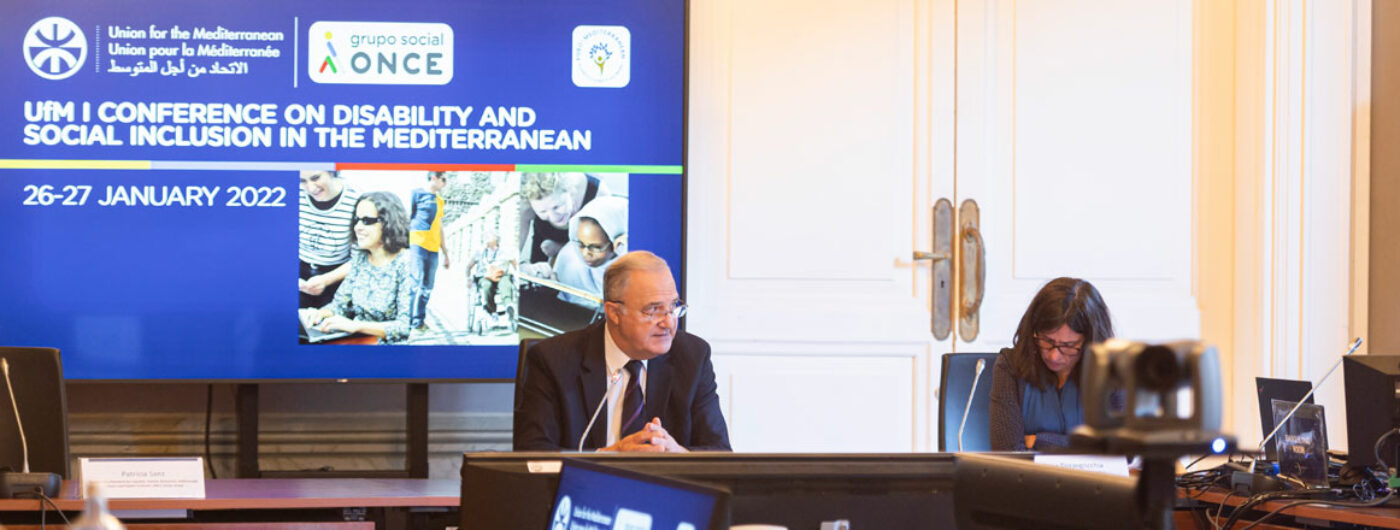
The UfM and ONCE organise the I Conference on Disability and Social Inclusion in the Euro-Mediterranean Region
- Over 1 in 7 persons are experiencing some form of disability globally (WHO, 2021), and they face many barriers to inclusion in some key aspects of society, even more so in the context of the COVID-19 pandemic.
- Women with disabilities are at least two to three times more likely than other women to suffer violence.
- Only in the EU, accessible tourism has a potential economic market of 130 million people
26-27 January 2022. This 1st Conference on Disability and Social Inclusion in the Euro-Mediterranean Region, hosted in partnership between the Union for the Mediterranean (UfM) and the Spanish ONCE Social Group, took place in Barcelona seeking to analyse three key challenges in the post-COVID era: the limitations that persons of disabilities face to access human rights and employment, the importance of a gender perspective in agendas and recovery programmes and the role of accessible tourism.
The event brought together representatives of regional, national and international organisations of People with disabilities (OPD) plus the representative of the League of Arab States and the Spanish Agency for International cooperation on behalf of the Spanish Ministry of Foreign Affairs.
UfM Secretary General, Nasser Kamel, highlighted “the pandemic has exacerbated inequalities and barriers to the socio-economic inclusion for people with disabilities. Specific measures in national and local recovery plans should be adopted in order to ensure addressing negative consequences of the pandemic on persons with disabilities”
ONCE’s Director of International Relationships of ONCE, Javier Güemes Pedraza, underlined that «we are not starting now, there has been a lot of work coming from civil society, but we should reinforce the cooperation and structuralisation of the dialogue between civil society and governments in the region. Therefore, it is now time to have an structural support for international organisations such as the UpM to develop an agenda on disability in the region».
In her online participation, the European Union Commissioner, Helena Dalli stressed how “placing the rights of persons with disabilities high on the agenda at today’s conference and throughout its work program is crucial in order to achieve inclusive development in the Mediterranean region like elsewhere. It is all the more essential the moment when we are working on the response to the Covid-19 Pandemic and recovery. No one should be left behind.”
The different panels provided the audience with insights and data which highlighted both challenges as well as possible solutions when it comes to the social and economic inclusion of persons with disability. Among others, panellists how, compared to men without disabilities, women with disabilities are three times more likely to be illiterate, two times less likely to be employed and three times more likely to have unmet needs for health care.
In the area of employment, COVID-19 has impacted dramatically on the job market, especially for people with disabilities. Although there no effective data on employment rates in the Euro-Mediterranean region, the involvement of people with disability in the job markets is extremely low. It was stressed that national governments and civil society organisations should cooperate to open up routes to economic empowerment and financial inclusion, so that people with disabilities can enjoy decent work and achieve financial independence.
The debate also highlighted that tourism has a potential economic market in the EU of 130 million people. The representatives of the all the regional organisations stated as concrete implementation of any recommendations formulated during the conference will inevitably require an active involvement of, persons with disabilities as well as their representative organisations in designing, implementing and monitoring COVID-19 socio-economic recovery plans.
The conference was held in a hybrid format, all sessions were available in English, Spanish, Arabic and sign language, and streamed entirely on Youtube. The event was streamed live and was followed by almost 200 people.
UfM I Conference on Disability and Social Inclusion in the Mediterranean – Final Report


